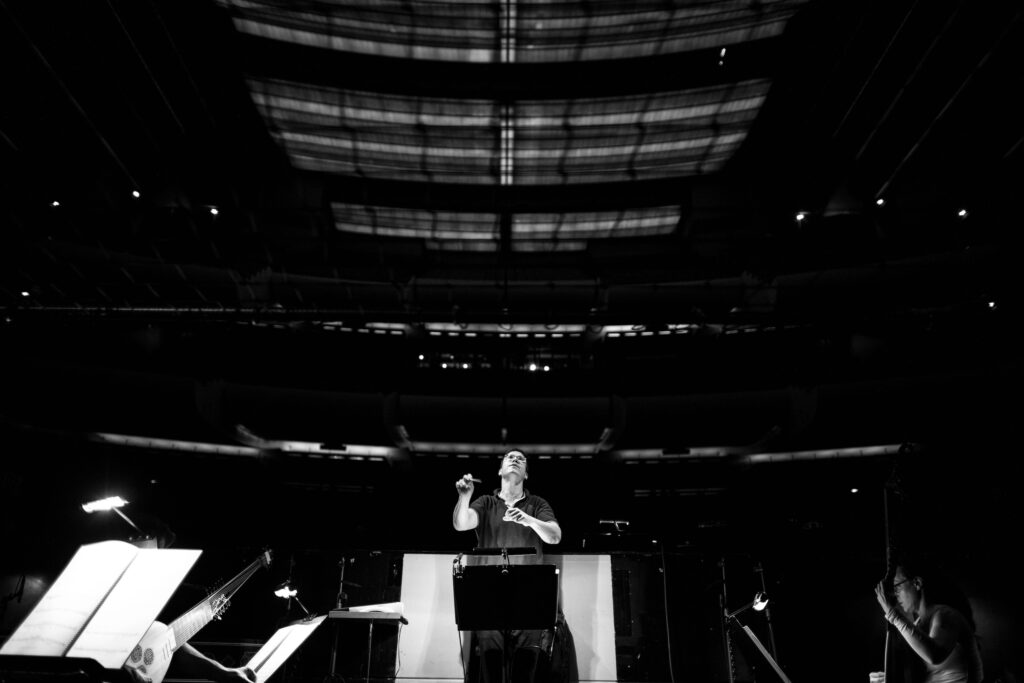


©Little Shao
” Not familiar with this opera by Antonia Bembo? No wonder: it’s never been performed, and its score sat untouched in the BNF until the Paris Opera entrusted it to conductor Leonardo García-Alarcón for its world premiere. “

Eight years after the success of Les Indes galantes, Leonardo García-Alarcón and Cappella Mediterranea return to the Opéra de Paris with a nugget: a score by Antonia Bembo, an 18th-century composer whose tumultuous life resembles a novel. Fuyant un mari violent, cette Vénitienne trouve refuge à la cour de Louis XIV, sous la protection du roi. En France, elle développe un style personnel, entre culture italienne et française, et compose en 1707 Ercole amante, reprenant un livret jadis mis en musique par son maître Francesco Cavalli. Jamais encore mis en scène, cet Hercule amoureux, à l’harmonie originale et à la grande virtuosité vocale, entre au répertoire de l’Opéra de Paris. Netia Jones s’empare de cette œuvre baroque peuplée de dieux et d’éléments surnaturels pour en révéler la modernité : celle d’un homme puissant, vieillissant, incapable d’accepter le refus d’une femme.
In a wood, Hercules laments: having vanquished so many monsters, he is distraught over his love for Iole, fiancée of his own son, Hyllus. Venus tries to help him by bewitching Iole, but Juno intervenes and, with the help of Sleep, plunges Hercules into a deep sleep. Iole moves in to kill him, but Hyllus stops her. Awakened, Hercules believes his son guilty of treason and wants to have him executed. He is appeased by the pleas of Déjanire and, above all, Iole, who agrees to give herself to him. Hyllus is spared, but imprisoned, and Déjanire forced into exile. Locked in a tower surrounded by waves, Hyllus, desperate to see Iole marry his father, tries to drown himself, but Juno saves him. As Déjanire and Iole mourn their loss – one her son, the other her lover – page Lychas reminds Déjanire of the existence of a tunic impregnated with the blood of the centaur Nessus, supposed to rekindle her husband’s love. Iole gives it to Hercules as a wedding present. As soon as he puts it on, it burns him horribly. Mad with grief, Hercules throws himself into the inferno. Dejanira mourns his death, Iole that of Hyllus… until the latter reappears, accompanied by Juno: she has saved the son from the waters and transported the father to heaven, now united with Beauty.
Tragedy in five acts – Music by Antonia Bembo (c. 1640 – c. 1720) to a libretto by Francesco Buti (1604 – 1682)
Inspired by Sophocles’ Les Trachiniennes and Book IX of Ovid’s Metamorphoses
Diapason 415 Hz
Leonardo García-Alarcón | Musical direction
Netia Jones | Stage direction
Maud Le Pladec | Choreography
Fabián Schofrin | Dramaturgy
Thibaut Lenaerts | Choirmaster
Andreas Wolf | Ercole
Ana Vieira Leite | Iole
Deepa Johnny | Dejanira
Julie Fuchs | Giunone Pronubea
Sandrine Piau | Venere / Bellezza
Alasdair Kent | Hyllo
Théo Imart | Paggio
Marcel Beekman | Licco
Teona Todua | Pasithea
Alex Rosen | Nettuno / L’Ombra di Eutyro
Cappella Mediterranea
Chœur de Chambre de Namur
19h30
Opéra Bastille – Preview
Paris, France
Accéder à la billetterie
19h30
Opéra Bastille
Paris, France
Accéder à la billetterie
19h30
Opéra Bastille
Paris, France
Accéder à la billetterie
19h30
Opéra Bastille
Paris, France
Accéder à la billetterie
19h30
Opéra Bastille
Paris, France
Accéder à la billetterie
19h30
Opéra Bastille
Paris, France
Accéder à la billetterie
19h30
Opéra Bastille
Paris, France
Accéder à la billetterie
14h30
Opéra Bastille
Paris, France
Accéder à la billetterie